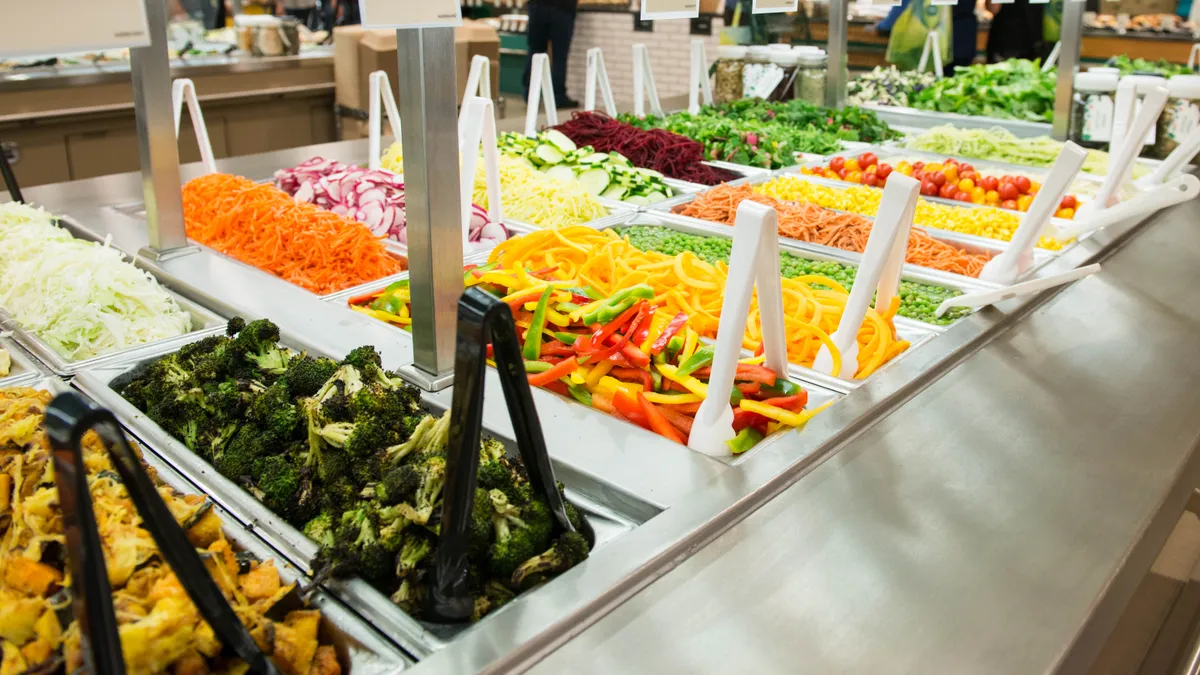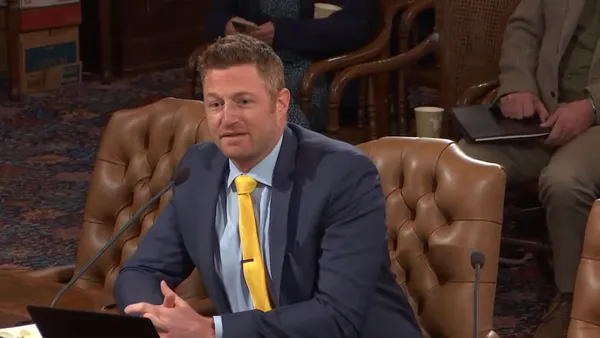Dive Brief:
- Nearly two-thirds of paper takeout containers often used at self-serve salad and hot bars appear to have been treated with PFAS, toxic chemicals that may have adverse health impacts, according to a study by the nonprofit Safer Chemicals, Healthy Families and Toxic-Free Future. The group tested 78 items – takeout containers, bakery or deli papers, microwaveable trays, muffin cups – from five of the largest U.S. grocery stores: Ahold Delhaize (Food Lion, Stop and Shop), Albertsons, Kroger, Trader Joe’s and Whole Foods. High levels of fluorine, which indicates they had been treated with the chemicals, were detected on 63% of takeout containers.
- Though researchers found only 10 total products with PFAS, five of 17 Whole Foods items tested positive for the chemical, reported Bloomberg. The Amazon-owned chain quickly removed packages cited in the report, noting its use of compostable options. Five bakery and deli papers and one single-use plate tested positive at the other chains, while cook-at-home products and baking supplies all tested negative.
- Manufacturers typically use PFAS chemicals in nonstick cookware and food packaging to repel grease, water and stains, according to the report. The chemicals have been found by the Environmental Protection Agency to cause tumors in animals. They have been linked to human health problems, including inflated cholesterol levels, low infant birth weights, thyroid disruption and cancer.
Dive Insight:
Safer Chemicals urged Whole Foods to address the widespread use of PFAS in its packaging in March during the organization’s “Mind the Store” campaign, Bloomberg reported Tuesday. The Bio-Plus Terra containers, though compostable, used a PFAS-based repellant called FlexSHIELD. Cascades Sonoco, which makes them, has pledged to eliminate the chemical.
Microwave popcorn bags, fast-food wrappers and pizza boxes regularly contain PFAS, repelling the grease inherent in those foods. Washington State passed a bill that would ban PFAS in food packaging, as long as the Department of Ecology can find a safer alternative by 2022. In November California added PFAS to its list of toxins known to harm reproduction, while San Francisco will ban fluorinated chemicals from foodware starting in January 2020, as well as polystyrene and non-recyclable or compostable packaging.
It’s still unclear how food manufacturers and retailers will deal with these local and state policy changes. A 2017 Silver Spring study found that 56% of dessert and bread wrappers and 38% of sandwich and burger wrappers probably contain PFAS, CNN reported. In the Safer Chemicals study, less than 20% of grocery products tested positive, showing that alternatives are not only widely available, but also competitively priced and used.
The popularity of ready-to-eat foods in grocery stores and so-called grocerants has perhaps exacerbated this packaging dilemma. Customers want the soup, the salad, the turkey and gravy, the pizza – but they don’t want salad dressing or greasy cheese soaking through the container onto their jacket or their car seat. PFAS keeps that liquid in check.
This fall, as environmental groups lobbied Congress for a ban, NPR noted these chemicals have been commonly used for decades. The EPA called for public comments on PFAS regulations days before releasing a report last month about the chemical’s effect on water, perhaps a more problematic reality.
Soil and water used in farming can transfer the chemical to food, as can processing equipment. Consumers don’t have to do anything unusual with PFAS-treated products to be affected: normal use and degradation causes exposure.
A two-year study by researchers at Harvard University determined it also contaminates the water supplies of 16 million Americans, PBS reported in 2016. Though that number falls under 1% of the U.S. population, just about everyone touches food packaging that likely bears these chemicals. They are some of the most widely used chemicals in the world because they do their job so well — and they cannot biodegrade.
Groceries and restaurants would be wise to follow consumer demand for more sustainable packaging. According to Asia Pulp & Paper's 2018 consumer trends report, two in three already say they care more about it than they did five years ago, and more than half will pay more for food sold in sustainable materials.
Correction: A previous version of this article incorrectly identified 3M as a manufacturer of PFAS chemicals due to an error in the source article.















